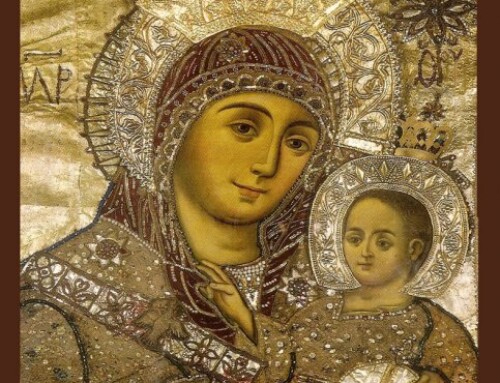Word Magazine December 1963
THE SACRIFICIAL ROAD. . .
TO HEAVEN
By REV. FR. THEODORE E. ZITON
Pastor of the St. George (Eastern) Orthodox Church, Wichita, Kansas
WE HAVE A TENDENCY today to believe that we can get to God’s mansions alone! Yet the road is not a lonely one with only our distinct figure trudging its ways: rather, the avenue to heaven is a sacrificial one crowded with responsibilities laid upon each and all desiring to traverse that pathway by the will of God, and we gain our momentum on this byway by living intently in readiness to answer the call of the “brother.” The winding road of ruggedness has its trials, but courage in the face of the unknown along this foreign vista with its various “signposts” of trials and joys, not only of and for self, but more so of and for others, instills an unwavering faith and confidence that man cannot be an island unto himself, for his shores are watered by the “needful” desires of others confidently trusting in him. It is within this framework that we must envision this route of sacrifice in a very real fashion, because there is no side road or short-cut to that eventuality we all seek.
At the recent Archdiocese conference held at Washington, D.C. the foregoing ideal was nobly interpreted by one individual of the convention city. The sentiments of the sacrificial road were evident from the morning hours until the decline of the day’s activities. It was so impressive to behold the work done by this “follower of Christ” and the distinction in that person’s attitude in fostering a most successful conference that a bit of heaven’s road was traversed and maybe even a bit of heaven might have been gained by the soul of that believer who was working fervently inspired by the memory of a departed paternal parent in the Orthodox Faith.
Naturally, the first and greatest obligation upon any follower of Christ, of the individual we have just passed comment on, or of anyone for that matter of fact, is that of saving his own soul, but to accomplish that end, according to the teachings of our Saviour, an individual must be “willing” to sacrifice anything that would interfere with saving his own soul, and yet, while in the process of being a traveler on the sacrificial road, not realize that he or she is ultimately working to gain heaven. Excerpts from the Holy Gospels relate that “home, brothers, sisters, father, mother, children or even possessions” are secondary matters when any of these would bar an individual’s way to heaven (MATT. XIX: 29). Other obligations towards the ideal of sacrifice such as “an eye, a hand, or a foot,” which represent the dearest treasures a man may own (MATT. XVIII:8-9) “when honor and worldly exaltation” (MARK IX:34); “When life itself” (JOHN XVI: 2) bar an individual’s way to heaven then and only then do the words ring true that the road to heaven is a sacrificial one.
One clergyman at the recent Archdiocese Convention related in his sermonette on “Love” that when Christ was asked, “which is the great commandment in the Law?” He answered: “You shall love the Lord your God with all your heart, and with all your soul, and with all your mind.” Then Christ added immediately. “you shall love your neighbor as yourself.” (MATT. XXII: 37-39).
Christ specified more clearly in the meaning of the second “commandment which was like unto the first” when He described the scene of the last judgment which is read on the Sunday of Meat-Fare in the Holy Eastern Orthodox Church. The Saviour tells us that the wicked will be condemned precisely because of the fact of what they failed to do (in sacrifice) for the least of their fellow human beings, which He spelled out to them in no uncertain terms (MATT. XXV:4l-46) “for as long as you did it not to one of the least of these my brethren, you did it not for me!” And their reward for failing to sacrifice is that “they will go away into eternal punishment. . . .”
In short, what that clergyman was trying to tell all in his sermonette was this one simple fact, and it does not take high-school or college degrees to understand it “You cannot go to heaven alone!” You can be condemned for what you have NOT done for others, but never for what you have sincerely, honestly and sacrificially done for the Christian welfare of others.
St. Paul expresses our obligations towards one another through the beautiful doctrine of our oneness in the Body of Christ. “For just as the body is one and has many members, and all the members of the body, though many, are one body, so it is with Christ. For by one spirit we were all baptized into one body.
And the eye cannot say to the hand, ‘I have no need of you,’ nor again the head to the feet, ‘I have no need of you’ . . . You are the body of Christ, member for member.” (I CORINTH. XII: 12-27).
St. John the beloved disciple speaks with great force on this matter. He says, “If anyone says, ‘I love God,’ and hates his brother, he is a liar. For how can he who does not love his brother whom he sees, love God, whom he does not see? And this commandment we have from Him, that he who loves God should love his brother also.” (I JOHN IV: 20-21) St. John also adds the measure of how much we must love others: “In this we have come to know His love, that He laid down His life for us: and we likewise ought to lay down our life for the brethren,” (I JOHN 111:16) Is it a sacrificial road to heaven or not?
The Church, which is the mystical Body of Christ, constantly keeps before us the teachings of Christ and the Apostles by providing us with urgings and opportunities to help the needy and the hopeless among our fellow men, and sights these ways as the chief corporal and spiritual works of mercy towards our fellow Christian brother.
How often we have heard the appeal of the Church on aiding and loving and sacrificing for one another? How often we have collected trays for the starving, for the homeless in other lands, for orphans, for the destitute who suffered privations, for the underprivileged, for the poor, as a constant repetition of Christ’s theme that whatever we do to the least of His little ones, even if it be but a “cold cup of water”, we shall in no wise lose our reward, for we do it for Him and in Him, because the road to His home is a sacrificial one.
The sacrificial road even contains reminders of the importance of prayers for one another, our good example for one another, our personal influence in behalf of all who need help, because in these “sufferings” we better see our way along this way where the “detour signs” are those marked “sacrifice.”
Can you go to heaven alone? No! For if you have helped no one along the road of life towards heaven Christ will not recognize you as His own when you meet Him … face to face In the end!”
* * *
For the wages of sin is death; but the gift of God is eternal life through Jesus Christ our Lord.
ROMANS 6:23
* * *
God hath given to us eternal life, and this life is in his Son.
1 JOHN 5:11
* * *
So then every one of us shall give account of himself to God.
ROMANS 14:12


